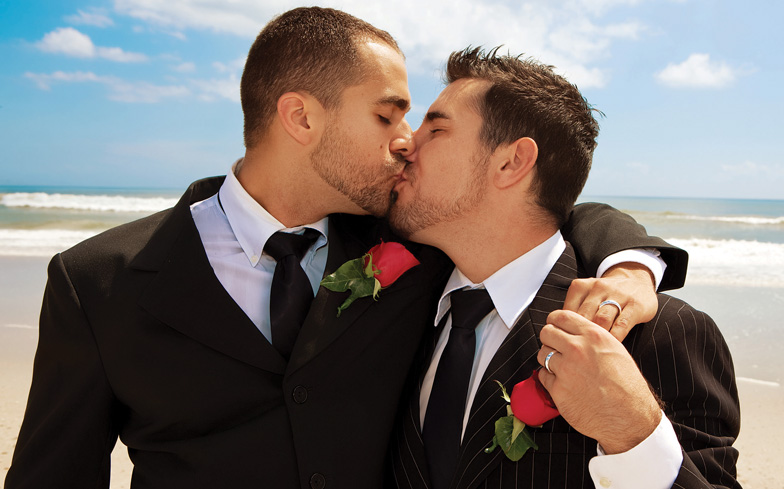Bermudian Joe Gibbons and his Canadian partner were ecstatic last year when the wealthy Atlantic island legalized same-sex marriage after a long struggle for gay equality – but their joy only lasted nine months.
For the British overseas territory of 60,000 people – known for low taxes and stunning pink-sand beaches – this month became the first jurisdiction in the world to reverse a law allowing same-sex marriage.
It was cause for celebration for many church leaders and thousands of Bermudians who gathered outside parliament on the usually sleepy island last year to protest the gay marriage law.
Yet the reversal sparked fears for lesbian, gay, bisexual and transgender (LGBT) rights activists that it may reverberate far beyond Bermuda and set a dangerous precedent for a gay rights rollback after years of gains across the Western world.
“This could open the door to undo marriage equality elsewhere,” said Jordan Sousa, founder of Bermuda’s Gay Straight Alliance, one of several local advocacy groups for lesbian, gay, bisexual and transgender (LGBT) rights, with 1,200-odd members.
Same-sex marriage has become legal in 26 nations since the Netherlands led the way in 2001. Austria and Taiwan are set to join this list following court rulings on the matter in 2017.
So it came as a surprise to many when Bermuda reversed its decision and introduced a new Domestic Partnership Act that let islanders form domestic partnerships but not marry. The government said gay couples who had wed would keep their status.
Only a dozen or so same-sex weddings have taken place in Bermuda or on cruise ships registered in the territory in the nine months since it became legal. It was unclear how many have gay marriages been cancelled as a result of the new legislation.
Feeling Vulnerable
Gibbons and his Canadian husband said they were among those who now felt vulnerable. They plan to move to Canada this year.
“One of the reasons we are leaving is the complete ambiguity of how the rights of same-sex couples will be guaranteed,” Gibbons, 64, told the Thomson Reuters Foundation.
“There is just a feeling that people are against you,” said Gibbons, who won a Supreme Court ruling in 2015 granting same-sex couples the same rights to live and work on Bermuda as heterosexual partners.
Bermudian lawyer Mark Pettingill, who won last year’s marriage equality case in the Supreme Court, has filed a motion to challenge the new domestic partnership law.
Some in the island’s LGBT community are lobbying Britain to intervene, although that appears unlikely to succeed given that Bermuda’s governor approved the law this month.
“This is like saying to Rosa Parks you can sit wherever you like on the bus, and then you tell her she cannot sit in the front two rows,” said Pettingill, a former attorney general of Bermuda, referring to the United States’ civil rights heroine.
Some rights campaigners have decried the influence of church over state in Bermuda where two in three people are Christian.
When René Hill – a Bermudian designer – gave a eulogy for her cousin in 2012, she thought it right to mention his life as an openly gay man but said she was interrupted by the pastor who appealed to the congregation to pray for the dead man’s sins.
Linda Mienzer, a lesbian station duty officer in the police service, said she faced opposition from her family and the church because of her sexuality, and had been called a “demon” by a bishop for wearing a bow tie while attending a service.
“The power of the church has made politicians in Bermuda prostitute themselves for votes at the expense of justice and human rights,” said Tony Brannon, a gay independent activist.
The ruling centre-left Progressive Labour Party (PLP), which includes some gay politicians, said its position on same-sex marriage strikes the right balance on the “divisive” issue.
“The act is intended to strike a fair balance between two currently irreconcilable groups in Bermuda,” Home Affairs Minister and PLP member Walton Brown, who proposed the new law, said in a statement earlier this month after it was approved.
It restates that marriage must be between a man and a woman while recognising and protecting the rights of same-sex couples, added Brown, who declined to comment any further on the matter.
He said LGBT tourists were still welcome to visit Bermuda.
But cancellations have been announced by several tourists in letters to the editor of the local newspaper, while visitors and LGBT activists have demanded a tourism boycott on social media.
“Individual travellers can vote with their feet,” said Kevin Dallas, head of the independent Bermuda Tourism Authority.







